- Home
- Roddy Doyle
Love
Love Read online
BY THE SAME AUTHOR
Fiction
The Commitments
The Snapper
The Van
Paddy Clarke Ha Ha Ha
The Woman Who Walked Into Doors
A Star Called Henry
Oh, Play That Thing
Paula Spencer
The Deportees
The Dead Republic
Bullfighting
Two Pints
The Guts
Two More Pints
Smile
Charlie Savage
Two for the Road
Non-Fiction
Rory & Ita
The Second Half (with Roy Keane)
For Children
The Giggler Treatment
Rover Saves Christmas
The Meanwhile Adventures
Wilderness
Her Mother’s Face
A Greyhound of a Girl
Brilliant
Rover and the Big Fat Baby
PUBLISHED BY ALFRED A. KNOPF CANADA
Copyright © 2020 Roddy Doyle
All rights reserved under International and Pan-American Copyright Conventions. No part of this book may be reproduced in any form or by any electronic or mechanical means, including information storage and retrieval systems, without permission in writing from the publisher, except by a reviewer, who may quote brief passages in a review. Published in 2020 by Alfred A. Knopf Canada, a division of Penguin Random House Canada Limited, Toronto. First published in 2020 in the United Kingdom by Jonathan Cape, an imprint of Vintage, part of the Penguin Random House Group, London. Distributed in Canada by Penguin Random House Canada Limited, Toronto.
www.penguinrandomhouse.ca
Knopf Canada and colophon are registered trademarks.
Library and Archives Canada Cataloguing in Publication
Title: Love / Roddy Doyle.
Names: Doyle, Roddy, 1958- author.
Identifiers: Canadiana (print) 20190239506 |
Canadiana (ebook) 20190239514 | ISBN 9780735279889 (softcover) | ISBN 9780735279896 (HTML)
Classification: LCC PR6054.O95 L69 2020 | DDC 823/.914—dc23
Cover design by Leah Springate
Image credits: (cello) © Mark Berndroth / 500px, (hand on cello) © ASphotowed / iStock,
(wood) © Wachirawit Jenlohakit / Moment, all Getty Images
a_prh_5.5.0_c0_r0
Contents
Cover
By The Same Author
Title Page
Copyright
Dedication
Epigraph
Love
Acknowledgements
About the Author
For Belinda
There stands the glass –
Fill it up to the brim –
’Til my troubles grow dim –
It’s my first one today –
‘There Stands the Glass’ by
Russ Hull, Mary Jean Shurtz,
Audrey Greisham
He knew it was her, he told me. He told me this a year after he saw her. Exactly a year, he said.
—Exactly a year?
—That’s what I said, Davy. A year ago – yesterday.
—You remember the date?
—I do, yeah.
—Jesus, Joe.
He saw her at the end of a corridor and he knew. Immediately. She was exactly the same. Even from that far off. Even though she was only a shape, a dark, slim shape – a silhouette – in the centre of the late-afternoon light that filled the glass door behind her.
—She was never slim, I said.
He shrugged.
—I don’t even know what slim means, really, he said.
He smiled.
—Same here, I said.
—I just said it, he said. —The word. She was a tall shape – instead.
—Okay.
—Not a roundy shape.
—She’s aged well, I said. —That’s what you’re telling me.
—I am, he said. —And she has.
—Where was the corridor? I asked him.
—The school, he said.
—What school?
—The school, he said again.
—We didn’t know her in school, I said.
I knew he didn’t mean the school we’d both gone to. We’d known each other that long. I’d said it – that we hadn’t known her in school – to try to get him to be himself. To give back an answer that would get us laughing. He was the funny one.
—My kids’ school, he said.
—Hang on, I said. —It was a parent–teacher meeting?
—Yeah.
—The woman of your dreams stepped out of the sun and into a parent–teacher meeting?
—Yep.
—Thirty years after the last time you saw her, I said. —More, actually. Way more. Thirty-six or seven years.
—Yeah, he said. —That’s it, more or less. What did you say there? That she stepped out of the sun.
—I think so, yeah.
—Well, that’s it, he said. —That’s what happened. She did.
I didn’t live in Ireland. I went over to Dublin three or four times a year, to see my father. I used to bring my family but in more recent years I’d travelled alone. The kids were grown up and gone and my wife, Faye, didn’t like flying, and she wasn’t keen on the drive to Holyhead and the ferry.
—Your dad never liked me, so he didn’t.
—He did.
—He did not, she said. —He thought I was a slut. He said it, sure.
—He didn’t say that.
—More or less, he did. You told me that, yourself, remember. I’m not making it up. He never liked me, so I won’t be going around pretending I like him. I hate that house. It’s miserable.
—She kissed me, Joe said now.
—In the school?
The man I knew – I thought I knew; I used to know – would have answered, ‘No, in the arse,’ or something like that.
—Yes, he said. —She remembered me.
I didn’t know Joe well.
I used to.
We left school for good on the same day. He got work; I went to college, to UCD. He had money, wages – a salary. I had none until after I’d graduated. But we kept in touch. We both lived at home, a ten-minute walk from each other. We listened to records in my house about once a week, in the front room. He bought most of the records; mine was the house where we could blast them out. We played them so loud we could put our hands on the window glass and feel the song we were hearing. My mother was dead and my father didn’t seem to mind. He told me years later he just wanted to see me happy. He endured the noise – the Pistols, Ian Dury, the Clash, Elvis Costello – because he thought it made me happy. I’d have been happy if he’d hammered at the wall with a shoe or his fist and told me to turn it fuckin’ down. I’d have been happy if I’d felt I had to fight him.
We went drinking, myself and Joe, when I had the money. At Christmas and in October, when I came back from working in West Germany and London, before I had to spend the money I’d earned on books and bus fares. We’d get quickly drunk and roar. I rushed straight into anger. I thumped things, and myself. I let myself go, glimpsed the man I could become. I pulled back, and copied Joe. He drank, I drank. He laughed, I laughed. I roared when he roared.
—She remembered you?
—Yeah, he said. —She did. Immediately. Like I said.
I looked at him again. I could see why she’d have
recognised him. The boy – the young man – was still there. His head was the same shape. He’d worn glasses back then and he still did – or, he did again – the same kind of black-framed glasses. He still had his hair. It was grey now, most of it, but it had never been very dark. He’d put on weight but not much, and none of it around his face and neck.
—Where were you? I asked him.
—In the school, he said. —I told you.
—Where, though?
—Outside the maths room, he said. —Waiting.
—For your turn with the teacher.
—Yeah, he said. —There were four or five people – mostly mothers – ahead of me. And I’d no one else to see – I’d seen all the others. We divided the list.
—Hang on, I said. —Trish was there as well?
Trish was his wife.
—Yeah, he said. —She was somewhere else. Queuing up for another teacher.
—You kissed the love of your life while Trish was in the building?
—Big building, he said. —It’s a fuckin’ school – in fairness.
That was more like the man I thought I knew. The man I’d wanted to be.
—You kissed her, I said.
—She kissed me.
—Where was Trish, exactly?
—Exactly, Davy? Exactly? Is this a murder investigation?
—Okay.
—For fuck sake, Davy.
—Okay – sorry. Go on.
—The home economics room, he said. —Or woodwork. Somewhere else. We took four teachers each, to get it over with as quickly as possible. Even at that, it took all afternoon. It’s the only chance the teachers get to talk to adults. So, they fuckin’ grab it. I was lucky.
—How come?
—I got to meet the maths teacher, he said. —A gobshite, by the way. But I was outside his door. I just happened to be there.
—And she walked in while you were waiting.
—Right place, right time. Yeah. Like I said – I was lucky.
—One of your kids does home economics and woodwork?
—What?
—You said home economics or woodwork. Trish was in one of those rooms.
—You’re being Columbo again, Davy.
—Lay off.
—I just meant – like, for example. The rooms. Trish was somewhere else, in one of the other rooms, you know. Way off somewhere in the building.
—Which kid was it?
I’d never met his children and I didn’t know their names. We told each other about the kids, brought each other up to date whenever we met, and then forgot about them. I hadn’t seen Trish in twenty years.
—Holly, he said.
—You sure?
—Yeah, he said. —Of course, I am. Fuck off.
—Okay.
—You’re being a bit of a prick, Davy.
—I’m not.
—You are.
—It’s a bit of a shock.
—Why does it even matter?
—Okay.
—To you.
—I know.
I’d never seen him with his children but I knew he was a good father. And I knew what that meant. He was reliable. He’d given them their routines. He’d come home at much the same time every evening. He’d picked them up from football or gymnastics and he’d always been there on time. They’d seen him filling the dishwasher and the washing machine. They’d seen him cooking at the weekends; they’d probably preferred his cooking to Trish’s. He’d served them Fanta in wine glasses on Saturday nights. He’d told them he loved them, twice a day, start and end. He’d read to them – the same book, again and again – gone swimming with them, slept on a chair beside them when they’d been kept overnight in Temple Street Children’s Hospital. He’d read about asthma, eczema, OCD, intersexuality. He wasn’t a man who didn’t know what subjects his kids had done in school. He would never have pretended that he was that man.
He was right. It shouldn’t have mattered. I shouldn’t have cared. But it did. And I did.
* * *
—
We saw her there the first day, at a table under one of the windows.
We’d found a pub that liked us. We’d wandered the city centre for months, every weekend, starting after work on Friday and ending ten minutes before the last bus home on Sunday night. This was after I graduated and had new money in my pocket. We’d escaped from my front room and the record player. I could buy my round. We were peers now and we could become the lifelong friends we hadn’t really been before. Getting drunk together, sneering at the world together, aching for the same women, denying it. We became the same man for a couple of important years. Before I left. Before he met Trish. Before I met Faye.
That day, the day we saw the girl who became the woman he saw years later, we got lost in the basement of Mercer’s Hospital. We’d left Sheehan’s on Chatham Street at the start of the holy hour – the pubs used to shut for an hour in the afternoon – and we’d wandered up to the Dandelion Market. But we were already too drunk – not drunk, exactly; more oiled – to flick through second-hand books and records. So we left, went back out on to South King Street. We got a bowl of chilli in a tiny place long gone and without a name; I’ll never remember what it was called. It was so small, it didn’t have a toilet. That was fine back then, normal, a restaurant or café without a loo. We were on South King Street again. We were the same man and we admitted we were bursting for a piss, really bursting, half an hour before the pub doors would open. Mercer’s Hospital rose before us and we went in, trying to look like young men visiting a sick relative, and – I don’t know why; I don’t think I ever knew – we went down the stairs to the basement, instead of up to the wards. I remember the ceiling being low, just above our heads. There was no one else down there, no charging men or women in scrubs. There were no stretchers or abandoned wheelchairs – I can’t remember any. One corridor became two corridors, and another two – and no toilet. We ended up pissing into an enamel bucket in a broom cupboard, first him, then me; there was only room for one of us at a time.
We passed a toilet on our way back out. We didn’t laugh. We were quickly ashamed – I was. The pubs were open when we got out into daylight, through a different door.
It was right in front of us. We’d never noticed it before. It had its own corner. We must have walked past it once or twice but we hadn’t seen it.
—Looks okay, said Joe.
And it did.
We were sober again. It was early winter, afternoon. The sky was clear and the sun was making blocks of yellow and grey – the last few hours before night, the perfect time for drinking. Mercer’s Hospital was behind us. Literally behind us. A pint would cure us, drown the shame. We’d start laughing again after the second.
We were twenty-one.
We looked in the window. It was plain inside, but a bit more than the standard Dublin pub. There was less wood, more light. There was one man sitting at the bar, his back to us. He was wearing a suit and there was a grey ponytail resting on the back of the jacket. It was the first time I’d seen a ponytail on a man who wasn’t on The Old Grey Whistle Test. There were tables along the other wall, under a line of windows. Only one of them was occupied, by four people – a man and three women. There was a cello leaning against the wall between two windows, and three violin cases sat on the table beside them. The women were drinking pints.
She was one of those women.
—Do we go in?
—Definitely, said Joe.
The double door was on the corner, under a porch. He went for the right side, I took the left. Both doors opened when we pushed, then walked in side by side – and sideways. The doors swung back into place behind us. We heard them creak, and rest.
There was no television, no horse racing. No radio, no music.
No one looked o
ur way.
The man with the ponytail was reading a magazine. It sat on the counter between his gin and tonic and an ashtray. The musicians were talking quietly. I didn’t know it then but the College of Music was around the corner, on Chatham Row. I heard strings and a trumpet coming from an open window the next time I passed it, the following Monday, when I was off on a wander during the lunch break. I’d been walking past the building for months.
There was no barman.
We stepped closer to the counter. We passed the musicians, went further – deeper – into the room, and took two stools at the end of the bar. We sat, and saw him. He was down on his hunkers, filling the lowest shelf with bottles of Britvic Orange. He heard us and turned, stood up, groaned, and smiled. It was the first time a barman had smiled at us.
—Gentlemen, he said.
He was happy to see us.
We stayed there for months.
* * *
—
She walked right through the thirty-seven years as she got nearer to him. The age crept across her face. Her back took a very slight stoop.
—But she was beautiful, he said.
Beautiful wasn’t a word we’d ever used. The women we’d liked were always gorgeous. But we saw her the first time and she was beautiful.
—And she knew me, he said. —She came right up to me.
—Was it the first time you’d seen her?
—What do you mean?
—It wasn’t the first parent–teacher meeting you’ve been to, I said. —Was it? And the school concerts, the football, hockey – all that stuff. All your kids went to that school, didn’t they?
—I know what you mean.
—You’ve been going up there for years then. Was this the first time you saw her?
—Yeah, he said. —Yes.
He said Yes; he’d changed Yeah to Yes. He was in the witness box.
—How come? I asked.
—How come what?
—All those meetings and matches and you never saw her.
—You don’t know the school, he said. —It’s huge. There’s over a thousand brats go to that place.
—Yes –, I said.

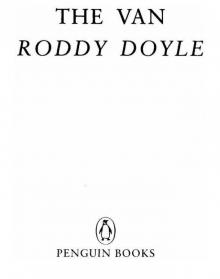 The Van
The Van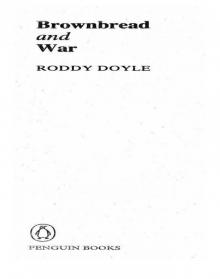 Brownbread & War
Brownbread & War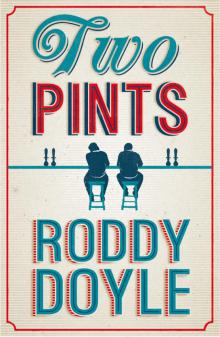 Two Pints: A Collection
Two Pints: A Collection Rover and the Big Fat Baby (Giggler 4)
Rover and the Big Fat Baby (Giggler 4)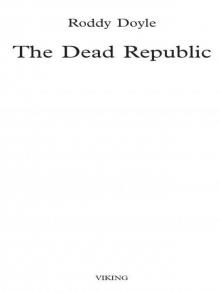 The Dead Republic
The Dead Republic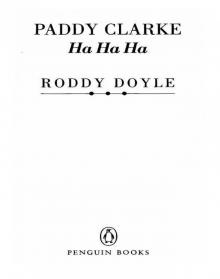 Paddy Clarke Ha Ha Ha
Paddy Clarke Ha Ha Ha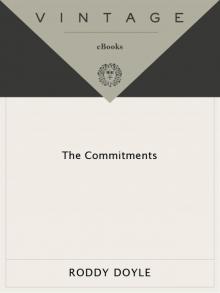 The Commitments
The Commitments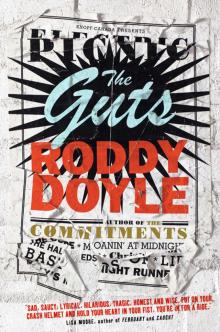 The Guts
The Guts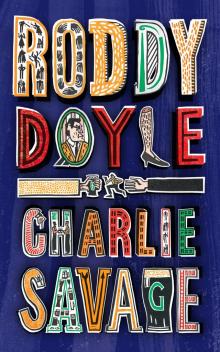 Charlie Savage
Charlie Savage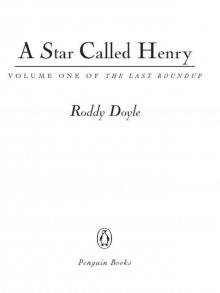 A Star Called Henry
A Star Called Henry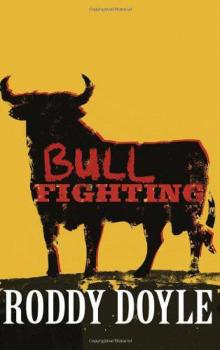 Bullfighting: Stories
Bullfighting: Stories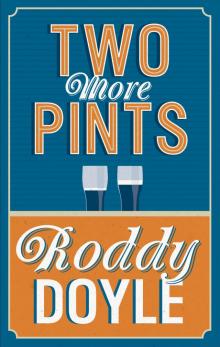 Two More Pints
Two More Pints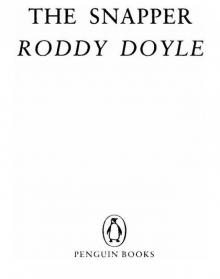 The Snapper
The Snapper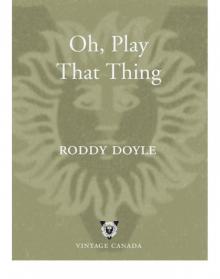 Oh, Play That Thing
Oh, Play That Thing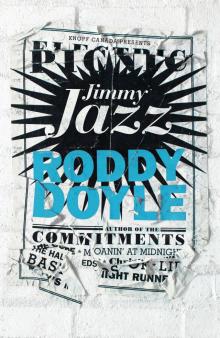 Jimmy Jazz
Jimmy Jazz Paula Spencer
Paula Spencer Wilderness
Wilderness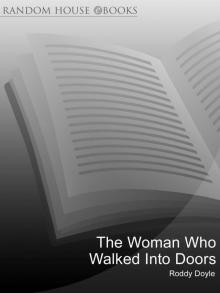 The Woman Who Walked Into Doors
The Woman Who Walked Into Doors The Deportees
The Deportees Rover and the Big Fat Baby
Rover and the Big Fat Baby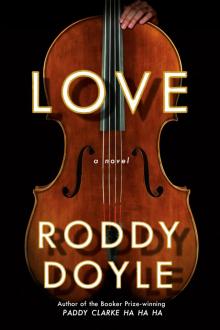 Love
Love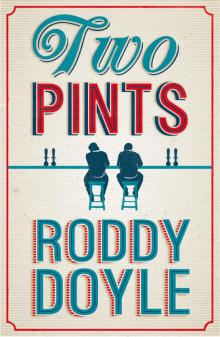 Two Pints
Two Pints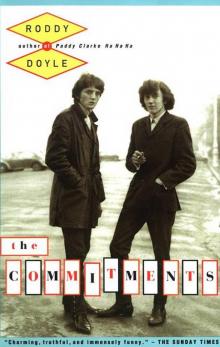 The Commitments b-1
The Commitments b-1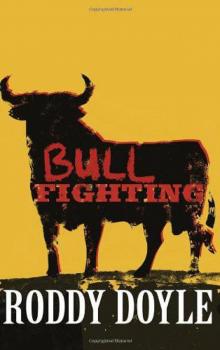 Bullfighting
Bullfighting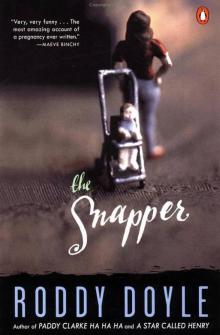 The Snapper b-2
The Snapper b-2